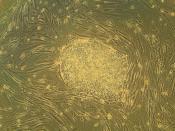The term 'stem cells' has become a trigger for a widespread, controversial debate. The debate about the ethics of Stem Cell Research has reached an international level and has generated concern about biomedical research in general.
Countless groups in society have been confronted about the issue, many of whom do not entirely understand the process in which takes Stem Cell Research involves.
So what exactly is Stem Cell Research you ask?
Stem cells are undifferentiated or blank cells, which can be found in human embryos, and have the potential to develop into any kind of body cell. Medical researchers believe that from these embryos, cells can be removed and placed into those who suffer from diseases such as Parkinson's disease and any paralysis. This research, as it requires the destruction of embryos, is incompatible with Catholic moral principles.
The Catholic viewpoint on Stem Cell Research is somewhat complicated. Although the Church supports medical research that can improve or save someone's life, which is stated in Article 2292 of the Catechism of the Catholic Church, it does not support the destroying of embryo's, as they believe that it should be treated as a person and that using them for research is 'murder'.
Thus, this is an evil action and according to Article 1759 of the Catechism of the Catholic Church, "an evil action cannot be justified by reference to a good intention".
The public, on the other hand, are almost equally divided on the issue. A recent news poll gave Australian society an opportunity to voice their opinions. When asked if they think the federal government should fund research that would use newly created stem cells from embryo's, 56 per cent said yes, 40 per cent said no and 4 per cent said they were not sure. The same people were...


